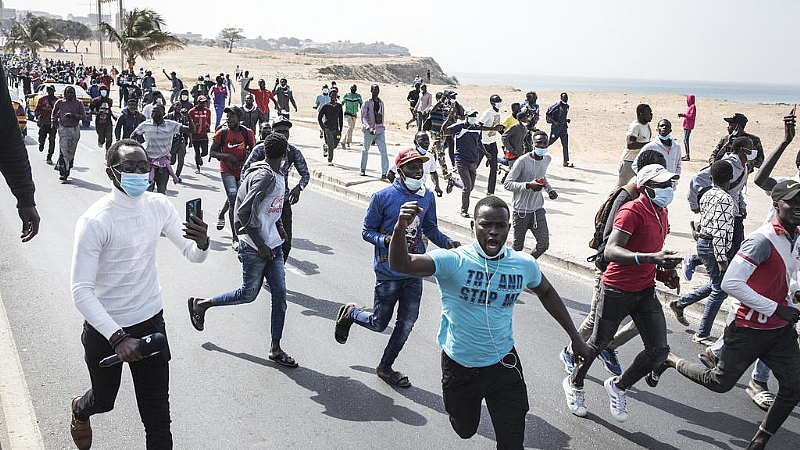
[ad_1]
Senegalese opposition leader Ousmane Sonko is due in court on Monday to answer charges of rape, which his supporters say are politically motivated. His arrest on Wednesday sparked days of widespread street protests and clashes with security forces in Dakar.
Sonko, a popular figure among Senegalese youth, left the courthouse on Friday after a high-ranking judge briefed him on rape charges, as well as death threats, and summoned him to appear before the court Monday, according to report by Charlotte Idrac from RFI.
A lawyer acting for Sonko, Abdoulaye Tall, told RFI that he was transferred very early in the morning and that his client did not have a legal representative during his hearing with the judges.
Senegalese authorities also traffic restrictions announced in Dakar, with mopeds and motorcycles banned in the streets, a measure most likely intended to curb the mobility of young demonstrators.
Violence broke out following the arrest of the 46-year-old man on Wednesday. He is accused of raping a beauty salon worker last month, allegations he denies. His supporters see the accusations as politically motivated.
Young people took to the streets to support Sonko and violent clashes broke out with security forces in the capital Dakar, as well as in the south of the country.
Scuffles with opposition supporters erupted Thursday at Cheikh Anta Diop University in Dakar, with security forces using tear gas and blank firing, while youths responded by throwing stones.
The UN weighs
Mohamed Ibn Chambas, United Nations representative for West Africa, calls on all actors demonstrate calm and restraint. He urged the authorities to take all possible measures to calm the situation and guarantee the constitutional right to protest.
Sonko has become a vicious critic of President Macky Sall since coming to power in 2012, and his supporters believe Sall is plotting to cripple the opposition leader ahead of the country’s next election in 2024.
The Dakar roads were blocked Thursday and violence also hit the suburbs of Parcelles Assainies, Pikine and Guédiawaye. Cars were set on fire and shops vandalized, with violence continuing until late Thursday night.
It appears that some of the protesters targeted French interests in the former colony, hitting Auchan supermarkets and Total gas stations. The Rfm media and the state-backed newspaper Le Soleil were also at the center of the protests.
In the Casamance region in the south of the country, at least one person has been killed, as protests erupted in the town of Bignona, where Sonko is from.
The government criticized “regrettable acts of violence and vandalism” in a statement, especially given the “current catastrophic health crisis”.
Reaction to the opposition
The Senegalese opposition denounced a “sordid political plot” to muzzle Sonko, while a new opposition coalition dubbed the “Movement for the Defense of Democracy” on Friday called for continued action in the streets of the western nation -african.
Several companies operating in the country have already signaled that they will remain closed given the tense environment and the extent of damage during Thursday’s protests.
The government of President Macky Sall has responded to the wave of support for Sonko by cracking down on the Internet.
NetBlocks, an organization that monitors internet access, noted restrictions on social media and messaging apps with access to Facebook, YouTube, WhatsApp and Telegram blocked.
Two private television stations, senTV and Walfadjiri, were taken off the air following protests. The country’s audio-visual authorities have warned other media outlets, warning against calls for a popular uprising or urging an insurgency during the broadcasts.
An uncertain future
“Senegal is heading for an uncertain future,” said Sejdi Gassama, executive director of Amnesty International in Senegal.
“The regime is determined to see it through, with increased repression,” Gassama told journalist Jeanne Richard.
“And on the other side, we have young people across the country determined to fight against a power they see as repressive,” he added.
Growing protests have contrasted with the stability of the country for many years.
Sonko won third place in the 2019 Senegalese elections, with 16% of the vote. He is a former tax inspector turned whistleblower, involved in the anti-corruption campaign and criticizes the government’s continued ties to the former colonial power, France.
During the election campaign, he promised to break Senegal’s association with the Paris-based West African CFA franc. He has attracted a dedicated and energetic following on social media, with some of his supporters claiming him as some sort of Thomas Sankara figure.
[ad_2]
Source link